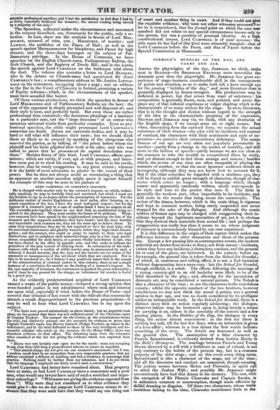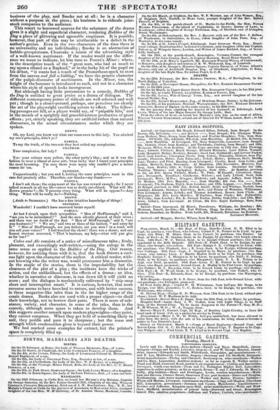JERROLD'S BUBBLES OF THE DAY, AND CAKES AND ALE.
AMONG the playwrights of the day, JEasiorm, we think, ranks next to Mumma—for SHERMAN KEOWLES more resembles the dramatic poet than the playwright. Mr. JERROLD has great ex- perience of stage-business, considerable skill in the management of points and situation, so as to make both tell, a keen enough eye for the passing "bubbles of the day," and more literature than is generally displayed by drama-mongers. His productions may be deficient in power, but that arises from want of substance : his composition is generally fluent, neat, and pointed, and never dis- plays any of that inflated emptiness or vulgar claptrap which is the characteristic of so many writers for the stage. In mere literature, that is in the thought and diction without regard to the strength of the idea or the characteristic propriety of the expression, BuLwEa and JERROLD may vie, we think, with any dramatist of the English stage, if we except some six or eight names. But when, descending from the outward form, we examine the actual substance of their dramas—the plot with its incidents and manner of conduct, the characters with their sentiments and style of ex- pression—we perceive their extraordinary deficiency. The comic dramas of one age are very often not popularly presentable in another—partly from a change in the modes of morality, and still more in the fashion of speech—partly because we are too close to the manners to take the trouble to comprehend them by study, and yet distant enough to feel them strange and remote ; besides which, the actors of one time are often incapable of playing the manners of another, so that the most ignorant audience detect an incongruity, although they may not know how to account for it. But if the older comedies be regarded with a studious eye, they will be found to exhibit great strength of character, though of cha- racter which exists no longer ; with a language which, though coarse and apparently carelessly written, nicely corresponds in its style and tone to the person that uses it. The fable is generally the weakest part, often improbable in its incidents, and still more in the means that bring about the catastrophe. The action of the drama, however, which is the main thing, is vigorous and kept in constant motion, being rarely suspended and never stopped for the sake of the dialogue. And although the comic writers of former ages may be charged with exaggerating their in- cidents beyond the legitimate necessities of art, yet it is obvious that they derived their materials from actual life ; and perhaps the exaggeration was really less than it seems to us, whose judgment of manners is unconsciously biassed by our own experience. It is this difference in the origin of their matter which makes the difference between the older dramatists and those of the present day. Except a few passing hits at contemporary events, the modern materials are drawn from books or fancy, not from nature : incidents, (when they have any incidents,) characters, conduct, and the genera air or cast of the piece, are borrowed. In the comedy before us, for example, the general idea is taken from the School for Scandal; of which, in smartness and telling effect, it is not a bad imitation without degenerating into a mere copy : but the School for Scandal, though artificial, is a whole. The effects following the marriage of a young country-girl to an old bachelor were likely to be of the kind described in the play ; and, allowing for the necessities of dramatic art, may be considered a natural picture. The Nabob's also a character of the time ; so are the characters in the scandalous coterie; whilst the opposite conduct of the two brothers, however mischievous we may now think the moral it points, was a general opinion in that age, and was no doubt considered by its profligate author an indisputable truth. In the School for Scandal, there is a distinct story with an action regularly advancing ; the dialogue, whatever labour may be bestowed upon it, being merely a means for carrying it on, unless in the assembly of the coterie and a few passing places. In the Bubbles of the Day, the dialogue is ever; thing, the action almost nonexistent : in the first act there is nothing but talk, till the last few lines, when an intimation is given of a love-affair; whereas in a true drama the first words indicate something of the story. The details are borrowed as well as the general idea. The assumption of a false character by Pamela Spreadweasel, is evidently derived from Letitia Hardy in the Belle's Stratagem. The marriage between Pamela and Young Brown directed by a will with a forfeiture in case of refusal, is not only contrary to the habits of the present day, but is a common property of the older stage ; and on this event every thing turns. Spreadweasel is also a character of the stage, not of the time ; and all his discourse and conduct are unnatural, though amusing. The jealous scenes between Melon and Florentia, in spirit call to mind the Jealous Wffe ; and possibly Mr. JERROLD might unconsciously have had that drama in his memory. The rest, with the exception of Sir Phoenix Clearcake and Captain Smoke, is in substance common or commonplace, though made effective by skilful dressing or disguise. Of these two characters, whose traits doubtless belong to the time, Clearcake contributes little to the
business of the play, and Smoke not at all : he is a character without a purpose in the piece ; his business is to ridicule joint- stock companies to the audience. This resort to borrowed sources for the substance of the drama eyes it a slight and superficial character, rendering Bubbles of the Pg a piece of glittering and agreeable emptiness. It is possible, however, that part of this may be attributable to a defect in the author's genius. Even in the two characters of the time there is no universality and no individuality ; Smoke is an abstraction of bubble-prospectuses, Clearcake a mimic of the advertising style of a well-known auctioneer. If the reader would see the differ- ence we mean to indicate, let him turn to FOOTE'S Minor; where, in the descriptive touch of the "great man, who had as much to say upon a riband as a Raphael," or in the lucky hit of the pupil on his debut, "it wants but a touch of the Promethean spark to start from the canvas and fall a-bidding," we have the generic character of the pulpit-discourse of auctioneers. In the Minor, too, the knight of the hammer is introduced as such, and not in a character where his style of speech looks incongruous.
But although having little pretensions to a comedy, Bubbles of the Day is entitled to great praise as a drama of dialogue. The different contemporary points of ridicule are well selected and well put ; though in a closet-perusal, perhaps, one perceives too clearly the art of the playwright sacrificing nature to effect. The follow- ing passages are full, as a player would say, of "palpable hits," and in the mouth of a sprightly and graceful actress productive of great effects; yet, strictly speaking, they are artificial rather than natural discourses, in the actual circumstances under which they are spoken.
BROWN.
Oh, my Lord, you know not what our cause owes to this lady. You admired my son's principles, didn't ye ?
PAMELA.
To say the truth, of the two sets they best suited my complexion.
CHATHAM.
Your complexion, fair lady? PAMELA.
Yes: your colours were yellow, the other party's blue ; and as it was the fashion to wear a riband of some sort, 'twas lucky that I found your principles the most becoming. rm sure there were marly who couldn't give a better reason for 'em. • •
SKINDEEP.
Unquestionably; but you and I, holding the same principles, must in this case feel precisely alike. Therefore, our thanks-my thanks—
PAMELA.
I don't ask them; the enjoyment of the fun was reward enough ; for I never talked so much in all my life-never was so drolly catechized. What will Mr. Brown promise ?-11e '11 promise every thing. What will he oppose P-Any thing. What will he really do ?-Nothing.
BROWN.
(Aside to SKINDEEP.) She has a fine intuitive knowledge of things !
SKINDEEP.
Wonderful ! I couldn't have answered better myself.
PAMELA.
At last I struck upon their sympathies. " Men of Muffborougb," said I, "are you to be intimidated ?" And the men silently glanced at their wives ; and there was no doubt of the fact. "Men of Muffborough," said I, "are you husbands?" " We are," said two or three of the boldest, "and sorry for "Men of Muffborough, are you fathers, are you men ? in a word, will ru sell your voices ? " I had touched the chord ! there was a shout ; and one honest creature answered, "That 's business, my lady-what will you give us for 'em?"
Cakes and Ale consists of a series of miscellaneous tales ; lively, pleasant, and exceedingly well-written,—using the eulogy in the same sense as applied to the Bubbles of the Day. Our reason, however, for noticing them with it is, that the book throws a curi- ous light upon the character of the author. A critical reader, with- out knowing who the writer was, would pronounce him a dramatist. In the staple of the stories, there is the improbability but the clearness of the plot of a play ; the incidents have the tricks of action, and the unlikelihood, but the effects of a drama ; an idea, .whether in narrative or discourse, is run down till it will yield no snore ; and the dialogue is mechanically enlivened by "snip-snap short and interruption smart." It is curious, however, that more recourse seems to have been had to nature, and with better success, in these magazine-like tales than in the far higher range of the comic drama. Books also are used with a proper object—to distil their knowledge, not to borrow their parts. There is more of sub- stance, variety, and character, in some of the tales, than in the comedy, although more space is taken to develop them. And this suggests another remark upon modern playwrights—they point, they cannot compress. When they get hold of something likely to suit, they peddle and pare it to sharpness ; but the mass and strength ivhich condensation gives is beyond their power.
We had marked some examples for extract, but the printer's space is completely filled up.



























 Previous page
Previous page